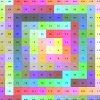Number Theory Seminar
One of the most elegant edifices in number theory is Lubin–Tate theory, which uses the theory of formal groups to give a way to construct extensions of local fields in a way that is similar to the way torsion points of abelian varieties can be used to construct abelian extensions of CM fields via the theory of complex multiplication. Lubin–Tate theory can be used to give a slick proof of local class field theory and indeed gives an explicit class field theory for a general local field, something which is lacking even today for almost all global fields.
In this talk, we will explain a well-studied generalization of Lubin–Tate theory from $GL(1)$ to $GL(n)$ called “non-abelian Lubin–Tate theory,” how the $\ell$-adic étale cohomology of "Lubin–Tate space" realizes the local Langlands and Jacquet–Langlands correspondences, and some new results on their relations to Rapoport–Zink spaces, which are generalizations of the relevant spaces here where $GL(n)$ is replaced by an arbitrary reductive group over a local field. Namely, we’ll show how we can pass certain cohomology classes between the Lubin–Tate spaces and the Rapoport–Zink spaces associated with symplectic and orthogonal groups and how such knowledge can be applied to understand more familiar number theoretic objects.
